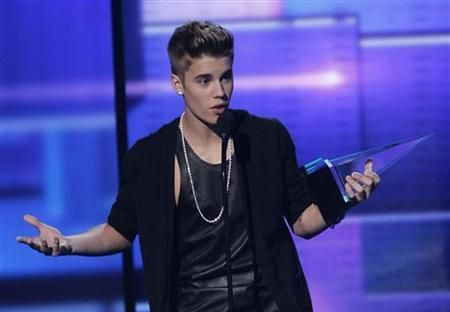Justin Bieber Wants New Laws Against Paparazzi; Why It’s Unlikely To Happen

In the wake of the death of a Los Angeles paparazzo, Justin Bieber called Wednesday for new laws to curb the aggressive behavior of such photographers. Bieber is no stranger to paparazzi and has even broken laws to get away from them.
A paparazzo was killed on New Year's Day when he was hit by a car after trying to chase down Justin Bieber's Ferrari (which he mistakenly thought the singer was in), reports the Los Angeles Times. Bieber's car, driven by a friend, was pulled over for speeding, and the photographer, who has not been identified by police, pulled over behind it, despite being warned off by the cops. He was then struck and killed by another vehicle.
Previously, Bieber has had several encounters with paparazzi that have caused him to champion anti-paparazzi laws.
In May, a paparazzo claimed Bieber had attacked him for photographing him and his-then girlfriend, Selena Gomez. That case was ultimately dismissed in November. In July, Bieber got a speeding ticket as he sped down California Highway 101 as he was being chased by a paparazzo.
This latest incident, now a fatal one, has raised more concerns about the paparazzi and creating a law that would restrain the aggression of celebrity-chasers. Miley Cyrus, for one, took to Twitter to support Bieber and to voice her support for new laws aimed at paparazzi.
Cyrus said in a series of tweets, “Hope this paparazzi/JB accident brings on some changes in '13 Paparazzi are dangerous! Wasn't Princess Di enough of a wake up call?! It is unfair for anyone to put this on to Justin's conscious as well! This was bound to happen! Your mom teaches u when your a child not to play in the street! The chaos that comes with the paparazzi acting like fools makes it impossible for anyone to make safe choices.”
According to a statement released by Bieber, reported by the LA Times: “Hopefully this tragedy will finally inspire meaningful legislation and whatever other necessary steps to protect the lives and safety of celebrities, police officers, innocent public bystanders and the photographers themselves.”
In the July incident, the paparazzo, Paul Raef, was charged for his role in the high-speed chase. Raef was charged under a 2010 anti-paparazzi law in California, But the judge presiding, Superior Court Judge Thomas Rubinson, struck down the law. The D.A. is appealing that ruling.
Rubinson said the law was very broad and infringes on some aspects of the First Amendment, notes The Associated Press. The 2010 law adds a new charge to an existing crime, which carries a possible penalty of six months in jail and a $2,500 fine, if the crime was committed “with the intent to capture any type of visual image, sound recording, and other physical impression of another person for a commercial purpose.”
Considering the absolute protections of the First Amendment, such a law is questionable. News-gathering can mean many things and celebrity photos can be deemed as such. It’s also completely legal and a protected right for a person to take photos of people and other objects in public.
E! covered the death of the paparazzo as well as Bieber and Cyrus’s calls to action and believes that any anti-paparazzi law would be difficult to get passed. Speaking to E!, Ian Wallach, a criminal defense and constitutional rights attorney, said “if the aftermath of Diana's death didn't change anything, I doubt that the death of a paparazzo who thought he was chasing Justin Bieber is going to change anything.”
E! also notes that paparazzi can be charged under several other existing offenses, such as stalking.
Given the constitutional issues, E! believes that it is unlikely any new law would stand. Wallach says “If people want to make laws that limit what the paparazzi can say or do, they're going to have to make a federal constitutional amendment.”
© Copyright IBTimes 2024. All rights reserved.






















